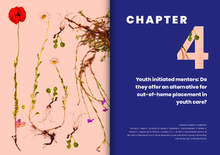ABSTRACT
The present study from the book Who and what works in natural mentoring? evaluates the Youth Initiated Mentoring (YIM) approach in which families and youth care professionals collaborate with an informal mentor, who is someone adolescents (12- 23) nominate from their own social network. The informal mentor can be a relative, neighbour or friend, who is a confidant and spokesman for the youth and a cooperation partner for parents and professionals. This approach fits with the international tendency in social work to make use of the strengths of families socialt networks and to stimulate client participation. The current study examined through case-file analysis of 200 adolescents (YIM group n = 96, residential comparison group n = 104) whether the YIM approach would be a promising alternative for out-of-home placement of youth with complex needs. A total of 83% of the juveniles in the YIM group were able to nominate a mentor after on average 33 days. Ninety percent of the adolescents in the YIM group received ambulatory treatment as an alternative for indicated out-of-home-placement, while their problems were largely comparable with those of juveniles in Dutch semi-secure residential care. Results suggest that the involvement of important non-parental adults may help to prevent out-ofhome placement of adolescents with complex needs.

